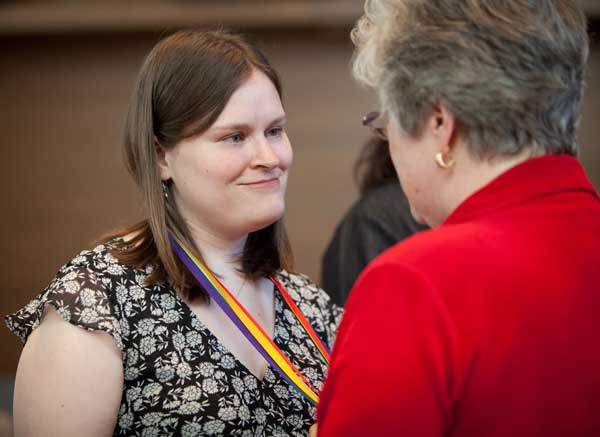KANSAS CITY, Mo. (RNS) Jennifer Harris Dault and her husband Allyn share more than marriage. Earlier this month they joined hundreds of other students graduating from the nation’s more than 220 seminaries with masters in divinity degrees.
But as the only woman graduate at Central Baptist Theological Seminary — out of a class of eight master of divinity students — the 29-year-old Jennifer Dault knows getting hired as a pastor likely won’t be easy.
“Being a woman, chances are that he (Allyn) will find a job before me, and I want him to have those opportunities,” Jennifer said. “But, I wonder, will a church ever hire me?”
Other women graduating from seminary may share Jennifer’s concern and with good reason: Although many major Protestant denominations have ordained women for decades, only about 8 percent of American congregations are led by women, according to a 2009 National Congregations Study.
The number of worshippers actually led by a woman is even smaller, at about one out of every 20 churchgoers. That’s because many women wind up at small, rural congregations.
Despite dismal odds, however, women continue to enter seminary with hopes of becoming pastors.
According to a recent report by The Association of Theological Schools, the overall enrollment in theological seminaries has decreased over the past five years. However, the number of women enrolled in theological seminaries and working on Master of Divinity degrees, has remained relatively constant.
Being the only woman in her graduating class can be lonely, Jennifer said. Most of the other women Jennifer knows in the American Baptist Churches seminary she attended were staff members. Growing up Baptist, Jennifer saw few women role models, even though she knew she always wanted to attend seminary.
“I thought all I could be was a missionary,” she said. The only women church workers she met growing up were missionaries, clerical workers and youth pastors.
After trying journalism briefly, Jennifer enrolled at Central Baptist Theological Seminary as a second-career student. But the call to pastoral ministry was too strong. So she decided to get her Master’s of Divinity degree, despite the employment odds.
Although Jennifer is networking with the national group Baptist Women in Ministry, she has yet to land a job offer.
In many Baptist circles, especially, women are viewed as ineligible to serve as a pastor—a fact that makes Jennifer bristle.
“Just because something’s popular doesn’t mean it’s right. I grew up knowing that there would be times that I’d be doing something people didn’t agree with” Jennifer said.
Other Protestant Christian denominations, however, are more likely to hire women clergy. Nearly 40 percent of clergy for theologically liberal denominations are women, although fewer than one in 10 U.S. churches describe themselves as such.
In contrast, fewer than five percent of more theologically conservative denominations are women. This is where women like Jennifer are challenging church rules that require clergy to be men.
So far, Jennifer has only applied to Baptist churches. But the hope of pastoring a congregation has led Jennifer to consider leaving her American Baptist denomination for a theologically similar denomination with more openness toward women in the pulpit.
Central Baptist Theological Seminary President Molly Marshall has been vocal in advocating for stronger women’s roles in Baptist ministry. Marshall, who says she seeks to change Baptist life from within, understands that “Baptists have lost lots of good women to other denominations, Methodists in particular.”
It’s a conundrum with no quick or easy fix. “We’re not trying to throw men out of the church or anything,” Jennifer said. “I’m just trying to live my calling out, as best I can” — a calling that includes helping people feel God’s presence and caring in their lives.
END HARRISON





